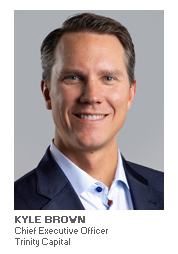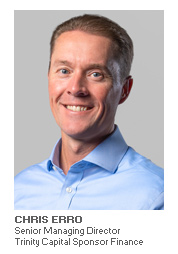
In early May 2024, Trinity Capital announced the expansion of its business with the addition of a new sponsor finance vertical – a strategic expansion that extends the Company's established expertise in providing direct lending solutions to sponsor-backed companies across a range of industries.
Leading Trinity's Sponsor Finance initiative is industry veteran Chris Erro, joining as a Senior Managing Director based in the firm's San Diego office. With over 20 years of experience across the capital markets and corporate finance, Erro has successfully managed and closed leveraged buyout transactions totaling more than $2.5 billion. Joining him on the Sponsor Finance team are Jorge Sandoval as Senior Managing Director, Credit & Portfolio, and Will Cook as Director, Credit & Portfolio.
ABL Advisor met with Kyle Brown, Chief Executive Officer of Trinity Capital, and Chris Erro to gain a greater understanding of what is behind this move into the sponsor finance space and where they see opportunities for this diverse commercial finance company both today and in the future.
ABL Advisor: Why is Trinity Capital entering this sponsor finance market today and have you ever worked in this market in the past?

Kyle Brown: I think about it as a natural progression for us, and maybe the best way to describe it is as an incumbency strategy. When our venture debt companies grow up, we lose them to more mature sponsor finance funds or businesses. Over the past 10 years, we've been adding multiple verticals that are all complementary to each other – focused on growth-oriented companies that are sponsor-backed, and on the precipice of EBITDA neutral. Now we have stepped into sponsored finance, which is really private equity buyouts and private equity backed companies that are growing rapidly that we wish to keep. It just hasn't been a real strategy and focus for us with seasoned veterans leading the process until now.
Internally, each of our verticals is run by a 20-plus year veteran. For example, credit is run by a 20-plus year veteran and has its own separate originations, credit underwriting and portfolio management. We didn't have this for sponsored finance, although we had been in the business for a while. So, this is an intentional effort to just say, ‘We're no longer just doing this for our best customers; we've got this great incumbency pipeline, so we are now going to attack it from all angles."

Chris Erro: When I think about my career arc and the alignment with Trinity, I started out in venture lending with Square 1 Bank, and that's very tangential to Trinity's existing venture debt/technology lending efforts. Then when Square 1 sold in 2015, I went to Ally, which was really a lower middle-market leverage finance group, and I started being exposed to what they were doing.
I think over the years, there's a lot of overlap between the two sectors. A lot of interesting things tend to come out of having experience on both sides and then trying to find the ground that's underserved or not clearly understood and find solutions.
Again, the fit with Trinity makes all the sense in the world.
ABL Advisor: So, it’s really about taking companies from an EBITDA negative position to the next level, and you don’t need to lose the customer. You can now retain customers, correct?
Brown: Yes, that's hitting the nail on the head.
ABL Advisor: But there will also be opportunities to do business with new customers as a result of this new focus. Obviously, that's going to be another part of the target, correct?
Erro: Yes. There are different shades of private equity. Some of the growth private equity firms look a lot like late-stage VCs, obviously they may have different economics and different approaches, but the underlying profiles of businesses trade from venture into private equity and then go from there. So, yes, it's serving the same customers, the companies, and also the private equity firms.
ABL Advisor: Please tell us about your position in the market. In other words, profile of the types of companies you are targeting.
Erro: Jorge Sandoval, who joined Trinity with me from Ally and heads underwriting and portfolio management, and I felt businesses that are trading at around $100 million in total equity value, up to about $500 million in total equity value, and are looking at leverage as a part of a transaction, were underserved from a direct lender standpoint. There was no one that was a clear and dominant leader in that sub-segment. There were certainly a lot of players at the top – the larger funds that service north of a billion dollars-plus in total equity value. We all know their names. But in that $25 to $100 million transaction size, we didn't feel there were players dominating the space which presented an opportunity for us.
ABL Advisor: How will you and your team work with established Trinity businesses such as the Venture Debt and Equipment Finance teams?
Brown: We have five different vertical markets including tech lending, which is your traditional venture debt, equipment financing, life sciences and healthcare, and warehouse lending. Each of those businesses is run by a 20-plus year veteran as previously mentioned, and each of those vertical market leaders is connected. We think of them as partners within the organization, so they are constantly interacting with one another. We have a COO within Trinity who manages those vertical market leaders to make sure that we're identifying synergies across the platform. We are set up very well to work in each of these vertical markets and moving relationships into the appropriate bucket when it makes sense. We are being very intentional about that right now.
Erro: We have all worked together, sometimes at prior institutions. It's a small world in what we do and there are a lot of relationships. I think Kyle's done a fantastic job of building the culture of Trinity. We're trying to deliver for the company and also deliver for the private equity or venture firms we serve. When there is an overlap in the products we provide, we have a significant competitive advantage.
Brown: That's a good point. We're trying to be a one-stop shop for growth-oriented companies, for everything they need other than that cheap line they can get from a bank. By having these different vertical markets, we have the ability to provide a suite of products for these customers – which is a bit different than what else is out there.
ABL Advisor: A number of banks have started sponsored finance groups to work with private equity firms because they don't want to lose their relationships to PE players. How do you compete against traditional lenders like banks in the sponsor finance space?
Brown: I'll let Chris talk about how we are doing that specifically in sponsor finance, but I'll provide a picture of how Trinity interacts with all the banks out there. We built the business by partnering with banks. Since 2008, we've been partnering with Silicon Valley Bank, Square 1, Bridge Bank and JPMorgan, among others. We have intercreditor subordination agreements and treaty documents in place with all the major banks. They think of us as a partner, which we have been for 15-plus years. We built that intentionally a long time ago to scale the business, and a good number of our referrals are coming in directly from the banks, because they think of us as a partner.
Erro: Those same banks Kyle mentioned have sponsor finance groups and we have been working with them, in my prior life, for 10+ years. Additionally, having come from a bank platform, I understand when a partner may be beneficial. If a bank is competing against a direct lender that is going to hold the whole loan, they may need a competitive option. We want to be an easy partner for them to work with in situations such as when they need to scale up leverage to compete.
Our typical deal structure is a unitranche structure where we can bifurcate that into a first out, last out. We can hold a last out position that affords us the ability to get the yield we need and the return we need for shareholders but allows the banks to play that first out role and provide bank capital with the ability to maintain those relationships.
We view the banks as super important partners. The banking space is very interesting for us, in that, I think they're looking for solutions to be able to compete within a more heavily regulated environment, and we hope to be a solution for them.
ABL Advisor: It seems like the stars aligned for you, Chris. What makes Trinity the right place for you?
Erro: I think it’s serendipitous to find Trinity as I have many relationships with Trinity people I’ve worked with in the past. I can’t tell you how important it is to have that DNA of lending to growth stage companies, because many of the big names with capital don’t understand it. It's hard to explain why not, since they are super smart, but it's not in their DNA. So, to find a firm where it’s embedded in their DNA that wants to expand in the space is again, a perfect fit. It was easy for me to make the jump. It's also a chance to be entrepreneurial. I got a taste of that at Square 1 Bank, living through the growth years of that institution. You're excited to go in and start building something. I can tell you that Trinity feels like a very special place to be.
ABL Advisor: Kyle, what makes this team special for you and Trinity?
Brown: Well, Chris touched on it, but our Chief Credit Officer, Ron Kundich, was one of the co-founders and initial guys at Square 1 Bank, so there's a lot of history there along with trust that's already been built. These guys have been successful, and they know the space. They came from that venture debt world initially. They understand growth-oriented companies. We're not trying to be the smartest people in the room. We are trying to get the smartest people for each one of these vertical markets and then build a team around them, invest in them, and make sure that they are successful. These guys are lifelong learners and entrepreneurial. They are excited to grow and build. Their culture fits all around. It was a no-brainer.
ABL Advisor: Is there anything we did not cover that you would like to discuss?
Brown: I think the last thing I'd mention is that from a capitalization standpoint, we have something that is very scalable with our internally managed BDC. There is no management company, there are no management fees or incentive fees. We are delivering outsized returns for investors. As such, we trade at a premium to NAV, which gives us access to the capital markets in a very unique way relative to our peers. And we've seen the ability to raise capital and grow.
We also received SEC approval to own a Registered Investment Advisor last year. We are now managing third-party capital off balance sheet. TRIN, the public company, can generate fee income above and beyond its loans, which generates more income, more earnings per share, and a higher ROE, giving us access to more capital.
I think we have a really interesting mousetrap for investors that's very beneficial for the private side and for the public market side, and this gives us the ability to scale a business like this, which could be quite significant.